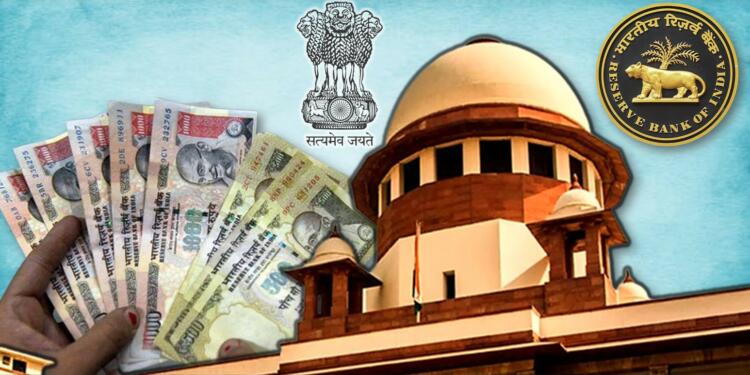Supreme Court on Demonetisation verdict: Gauging the resilience of Indian democracy in terms of electoral success has become one of the favourite pastimes of opposition parties. A crushing defeat is credited to the erosion of democratic values in the country while success is credited to the able leadership of its de facto heads.
While doing so, several political parties have been besmirching and trivialising the repute of prestigious institutions like the judiciary, Election Commission of India, Central agencies or constitutional and statutory bodies.
For their petty politics, they forget that these institutions have been ensuring that democracy thrives in India, remains dynamic and vibrant.
The recent verdict by the constitutional bench has struck hammer on this reprehensible destructive politics of opposition parties.
Supreme Court upheld Executive’s economic policy
Even before the new year’s celebration could subside, opposition parties have suffered a massive setback. Their vilifying campaign and attempt to erode the repute of institutions like RBI has met an excruciating end. The Apex Court’s five-judge bench, in a majority verdict of 4:1, upheld the Modi government’s decision to demonetise higher currency notes in circulation.
The decision was taken on 8th of November, 2016. After which the currency notes of Rs 500 and Rs 1000 were demonetised and they didn’t remain legal tender. There were around 58 petitions challenging the Union government’s decision. After hearing all sides, SC had reserved its judgments on 7th of December.
Pronouncing its verdict on January 2, the SC bench said: “There was consultation between the Centre and the RBI on before demonetisation. There was a reasonable nexus to bring such a measure, and we hold that the doctrine of proportionality did not hit demonetisation.”
SC upholds 2016 Demonetisation | Supreme Court says RBI does not have any independent power to bring in demonetisation and the decision was taken after the consultation between the Centre and RBI.
— ANI (@ANI) January 2, 2023
Also Read: 5 years of demonetisation and 5 years of India’s ever-growing digital economy
The majority’s judgement said, “Section 26(2) of the Reserve Bank of India (RBI) Act, which empowers the Centre to demonetize, cannot be interpreted only in relation to specific series of bank notes.”
The SC bench opined that the section should be read to mean all series of bank notes. The majority of the Justices noted that from the records placed before it by RBI and Central government, it appears that there was a consultation between the Central Government and the RBI for a period of six months.
So, in the view of inbuilt safeguards in Section 26(2) of the RBI Act, the decision cannot be struck down on the grounds of excessive delegation.
The majority has further held that the period for the exchange of notes, which was 52 days, cannot be said to be unreasonable. It is valid and satisfies the test of proportionality.
It added that the decision-making process cannot be faulted merely because the proposal emanated from the Central Govt. “There has to be great restraint in matters of economic policy. Court cannot supplant the wisdom of the executive with its wisdom.”
Congress still continues its hue and cry
The General Secretary (Communications) of Congress, Jairam Ramesh argued that it is wrong and misleading to say that the Supreme court upheld the decision of demonetisation. The Congress leader stressed that the SC only deals with the legality of the matter, not the outcomes received from it.
He said, “The majority Supreme Court verdict deals with the limited issue of the PROCESS of decision making not with its OUTCOMES to say that demonetisation has been upheld by the Honourable Supreme Court is misleading and wrong” .
Also Read: The long term effect of demonetisation: India is saving 1200 crores annually
Senior Congress leaders forget that in democracy, people’s verdict is reflected through elections. In nearly all elections, post-demonetisation, Congress has tried to corner the Modi government terming the move as disastrous, one that crippled the Indian economy and took away livelihoods of millions. The result is before everyone to see, Congress is needlessly dragging an issue on which it regularly kept losing in people’s court.
Now that the matter of legality of demonetisation has been sorted by the Supreme Court, Congress should start practising constructive politics rather than creating an unrecoverable wedge between elected governments and institutions that have been keeping democracy alive in India.
Support TFI:
Support us to strengthen the ‘Right’ ideology of cultural nationalism by purchasing the best quality garments from TFI-STORE.COM
























